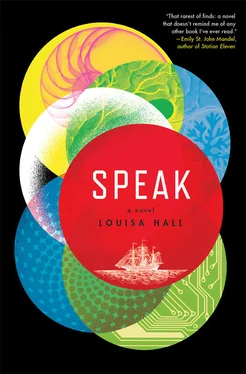It occurs to me now, as I record this for posterity, that in that lonely time in my life a bot of the kind I later created might have provided real consolation. If I could only travel backward in time to bestow a Chinnian robot on Stephen R. Chinn at the age of eighteen! Perhaps that will be my next invention: time travel, to dispense my other inventions. But then again, maybe those bots are better off dead. It pains me to know how the survivors are treated. I’ve heard, for instance, that they’ve been illegally altered to slake certain adult desires. Dolls that escaped apprehension have been refitted for sordid purposes and are traded on dark Internet sites. I’ve caught snippets of tales, whispered among prisoners with undisguised envy, of marriages between humans and bots. It’s hard for me not to despise such arrangements. Those unhappy creatures aren’t fully human; they’re incapable of giving consent. They’re doomed forever to be used to our ends. One fellow prisoner recently thanked me for providing such a perfect companion. “Smooth as silk,” he confided, with a conspiratorial leer. “Liked everything I could think of, and she only talked when I asked her questions.”
In general, I don’t begrudge my comrades their urges. It’s natural to seek solace in touch. I myself haven’t taken a lover, but not because I’ve mastered desire. I’d like to lie next to a body. I’d like to be drawn back to earth. But then my memories are already fragile. I’d rather lie close to what I recall than replace my love with some prison husband. At night, I remind myself of her body: her asymmetrical breasts, her untamable hair. Already so much of her has faded, but sometimes, sometimes, she visits me here. How, then, could I risk a substitute, some noisy presence that might banish the shade?
I don’t say any of this in an attempt to sound noble. This is, after all, an account of my sins. I haven’t always been so correct. It does me no harm to admit at this point that during the years of my worst isolation, I often considered visiting a prostitute. Despite my many unattractive tendencies, however, I’ve never wanted to take advantage of another person’s misfortune. No, as I’ve already said, what I wanted was love. The gift of two physical and emotional lives, bound up and willingly interchanged. For this I continued to anxiously hope, but very little progress was made.
I recall one lonely walk from the science center at Harvard, when the too-early darkness of New England winter had already set in. I was heading homeward, and here and there lights came on in dorm windows. Suddenly I was overcome by the hopelessness of my condition. My legs became weak; I leaned against the cold form of a bronze commemorative statue. No one would save me. I would never join up with the others. I had always been completely alone. And yet, even then, I could console myself with the fact that I was a programmer, and a brilliant one at that. Cold comfort, yes, but still it was comfort. My sadness metastasized into pride. One day, I told myself, as I hurried back to my bedroom, crossing beneath ivied thresholds, my programming brilliance would be acknowledged. Then I’d attract a suitable girlfriend. Then I’d attract many suitable girlfriends. The women would flock to my genius like moths.
Needless to say, this line of thought is revolting, even for the mind of an eighteen-year-old boy. I’m now fifty-eight. I’ve been married to a woman I loved. I understand that women aren’t moths, that my sense of scale was completely off-kilter.
And perhaps it’s still out of whack. Of what importance are the thwarted desires of awkward young men, when the oceans are rising, the deserts are coming, and families are trading their freedoms for houses? But I had no such perspective when I was in college. I was just a computer-bound kid. We were still hopeful about new machines. The country teemed with nerd savants, Zuckerberg was my classmate at Harvard, Deep Blue had conquered Kasparov, Palo Alto was booming, and all of us were inventing. I felt nearly fully alive.
This un — fully fledged state continued after my graduation. Even when MeetLove.com was launched from my cramped Palo Alto apartment, I was still lonely. I worked out of my bed. Long hours at work meant that I rarely interacted with humans. Because they were so infrequent, the interactions I did have were triply awkward. Approaching a female, my limbs seemed to weigh twice their usual weight. My face expanded to blimp-like proportions. My lips thickened with dread. I approached potential companions with the sense of myself as an amorous cow. Even when MeetLove went public and the millions accrued in my bank account, when they called me the inventor of modern courtship, when I was profiled in every tech magazine and photographed only at flattering angles, my romantic bugs still hadn’t been fixed.
In desperation, five years into my adventures in adulthood, I concluded that I was working too much. At the age of twenty-six, I embarked on semiretirement. Pursuing some magazine picture of leisure, I moved from Palo Alto to Santa Barbara and bought a house on top of a mountain. It was my stilted idea of a Dionysian palace: vast mazes of rooms, fig trees, balconies, curtains of bougainvillea and a jacaranda that bloomed purple from February through mid-December. In the back there was an infinity pool, spilling over the mountain.
Such opulence insists on contentment, but I was very unhappy. I’d taken refuge in work. Cut down to part-time, I felt exposed, naked as a sea creature peeking out of his shell. Awkward, cutaneous, vulnerable to attack. What friendly acquaintances I’d maintained in Palo Alto were left behind; in Santa Barbara, I descended into solitude so thick that conversations with repairmen became anxious social occasions. Quiet dropped over my house.
For two lonely years, I woke overwhelmed by the weight of desire. From my office overlooking the ocean, I maintained my farce of a business, an involuntarily celibate dating tycoon. Once my eyes had grown bleary, I disrobed and swam laps in my pool. Later, exhausted, the man-child I was emerged from the water. Wrapped in a robe, I paced the halls of my Peter Pan Mansion, my Pansion, waiting for the arrival of Wendy. At 8:00 I ate a microwavable dinner. I sat on my patio, overlooking the sunset. Below me, clusters of palm trees were painted green-gold. Tousled by wind, their fronds resembled tangles of unspooled cassette tape.
Even from the perspective of prison, those were challenging years. I’d like to use my time machine to travel back to that house. I’d sit beside that unhappy child, keep him company while he ate his dinner. I’d reassure him that his loneliness would come to an end. I’d paint him a picture of his wife and his child. “For seven years,” I could tell him, “you’ll wander the desert, and then you will no longer suffer. You will be given a family.” Can you imagine how that would change him? It would give him such hope. Perhaps it would alter the course that he took. Perhaps even now he’d be happy. To keep that possibility open, I’d leave out the next part: “Seven years after that, you’ll be made a false prophet. You’ll preside over decline and be charged with the ruin.” I’d skip that little postscript, and merely point out to that child that he stands on the threshold of an invention.
It came to me one morning while contemplating a pineapple. The fruit had been left on the marble breakfast island by the housemaid I employed at the time. Her name was Dolores. She cleaned my sterile mansion in determined silence. She brought me groceries and laundry supplies and deposited them with the least possible fuss, then drove down the mountain to return to her life. She was not an effusive young woman. But that’s neither here nor there, at least at this point in the story. What matters now is the pineapple she left. I encountered it first thing in the morning, bleary-eyed in pajamas, burdened by my awful desire. Even in that state, the pineapple calmed me.
Читать дальше












